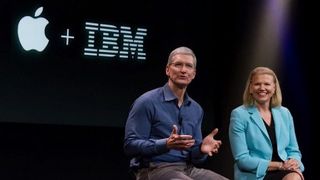What to expect from business tech in 2015
10 areas ripe for change this year
Mobile devices will also become increasingly large goals, but not necessarily for the goldmine of data they contain. Instead, attackers will look to exploit the new authentication methods (such as two-factor authentication and Apple's Touch ID) being used to safeguard personal data on smartphones as more users adopt such technology.

Apple embraces business
Everyone seems to have an opinion on what Apple may or may not do in 2015, but last year's enterprise partnership with IBM will certainly be hard to top for getting the iPhone and iPad into the hands of even more business users.
Already beloved by more than 98 percent of Fortune 500 companies, Apple's newfound assault on the enterprise was a clear shot across the bow at the likes of BlackBerry, fresh off their defeat in the consumer smartphone and tablet space. Apple is expected to kick off the year with an initial batch of IBM-powered MobileFirst for iOS apps, which will eventually include more than 100 titles available preloaded with new devices.
Apple is widely rumored to follow up the IBM partnership with a so-called iPad Pro, a business-centric 12.9-inch version of Cupertino's tablet likely to have more potential to replace Windows-based PCs than the Mac ever could.
Such moves could also help alleviate one of Apple's few Achilles heels: The seasonal marketing of the company's consumer lineup. The renewed focus on business could help shore up Apple's financials without customers having to line up for a new iPhone.
Falling cloud prices
There's little doubt 2014 will be remembered as the year of more affordable cloud storage for consumers and businesses alike, a trend most experts seem to agree will continue into the New Year. But challenges lie ahead as organizations weigh the convenience of public cloud services against the need for additional data security.
Amazon, Google and Microsoft made headlines last year duking it out over falling cloud storage prices, moves that had ripple effects across the rest of the industry. Even traditionally more costly services like Dropbox jumped into the price cut fray, while Microsoft made an annual Office 365 subscription look like a sweet bonus for users receiving an unlimited OneDrive storage bump.
Are you a pro? Subscribe to our newsletter
Sign up to the TechRadar Pro newsletter to get all the top news, opinion, features and guidance your business needs to succeed!
We expect Google and Microsoft to keep at each others' throats this year - after all, nothing is truly "free," and massive, cheap cloud storage offers each company an advantage when it comes to locking in businesses and consumers alike for the long haul.
Lower prices will continue to go hand-in-hand with more generous storage capacities in 2015, although businesses should expect prices to level out a bit, presumably with less dramatic decreases than last year.

Wearables for business
As the consumer world braces for the arrival of Apple Watch early this year, businesses are likely to be more focused on devices worn on areas of the body other than the wrist.
Forrester Research (via Information Week) recently predicted Google Glass could find its niche this year in the medical and manufacturing trades, after largely being ignored by consumers spooked about privacy and the general lack of style smart glasses have displayed thus far.
Perhaps because of lackluster consumer adoption to date, the wearables market also isn't expected to become the next big goldmine for developers in 2015. That could change if Apple or Google succeeds at growing their respective app store concept for smartwatches, but for now enterprise solutions are likely to be far more lucrative for software designers.
Wrist-worn wearables are also expected to cede ground this year to gadgets clipped onto clothing, or even built directly into the fabric. Ralph Lauren introduced (via CNET) such sensor-equipped smart shirts in time for last year's US Open, and other companies are working on jackets, shoes and even bras for this year.
Most Popular

